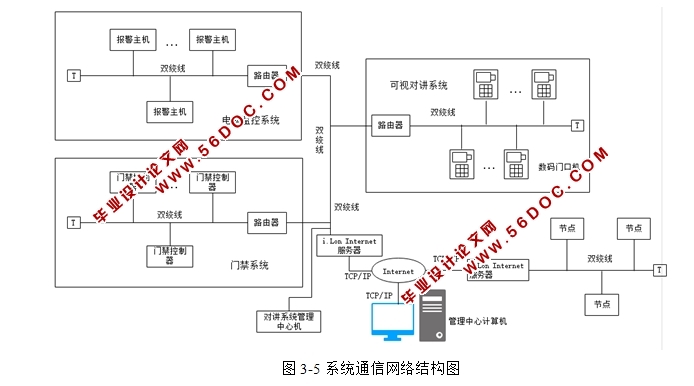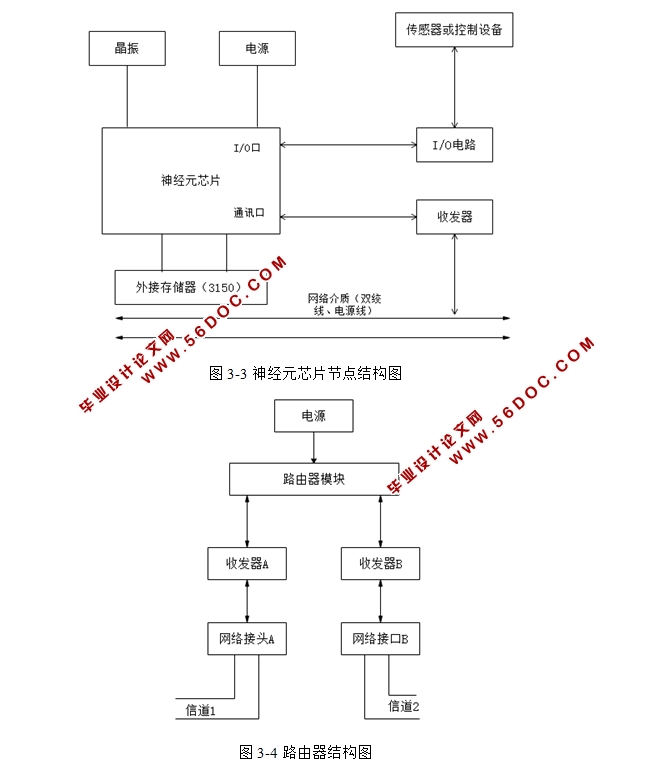智能楼宇安防系统中的通信网络设计
来源:wenku7.com 资料编号:WK716716 资料等级:★★★★★ %E8%B5%84%E6%96%99%E7%BC%96%E5%8F%B7%EF%BC%9AWK716716
以下是资料介绍,如需要完整的请充值下载。
1.无需注册登录,支付后按照提示操作即可获取该资料.
2.资料以网页介绍的为准,下载后不会有水印.资料仅供学习参考之用. 密 保 惠 帮助
资料介绍
智能楼宇安防系统中的通信网络设计(课题说明书,开题报告,中期检查表,论文12000字)
摘 要随着现代科学技术的发展和新技术的广泛应用,安全防范系统渐渐成为智能楼宇中必不可少的一部分。本文首先分别对目前智能楼宇安防系统所包含的三部分系统进行介绍,即可视对讲系统、电视监控系统和门禁系统,其中包括它们的组成部分、工作原理、设计原则及思路和功能实现等等。然后以目前楼宇的智能化需求为依据,以安防系统为设计对象,采用LonWorks通信网络技术,在总体组成结构、硬件实现和效果评估等方面对可视对讲系统、电视监控系统、门禁系统进行研究与通信网络设计。
关键词智能楼宇; 安防系统; 对讲系统; 电视监控系统; 门禁系统; LonWorks技术
Design of communication network in intelligent building security system
AbstractWith the development of modern science and technologyand the wide application of new technology, security system has gradually become an indispensable part of intelligent buildings. Firstly, this paper introduce the three parts of the current intelligent building security system, including the visual intercom system, television monitoring system and access control system.It contains their components, working principles, design principles and ideas and functions. Then LonWorks communication network technology is used to research and design the visual intercom system, TV monitoring system and access control system about the overall composition of the structure, hardware implementation and effect evaluation.
Keywords Intelligent buildings; Security system; Intercom system; Television monitoring system; Access control system; LonWorks technology
2.2系统的整体体系
智能楼宇的安全防范系统[3]一般包含防盗报警系统、门禁系统、可视对讲系统、电视监控系统、电子巡更系统和停车场管理系统。本文只对可视对讲系统、电视监控系统和门禁系统作详细的介绍和设计它们之间的通信网络。
2.2.1系统的硬件体系
计算机网络系统与智能楼宇安防系统已经密不可分。计算机网络系统能实时监控安防系统中所有系统的信息数据,一旦更新这里便会显示,而且它能让这些检测到的信息汇聚起来,从而方便管理分类,在发生突发状况时,可以控制实现报警信号,然后通知保安及时赶到处理情况。通过通信网络的线路连接以及信息传递,计算机网络系统[4]将分布在各处的很多个能独立工作的系统产生联系,让它们各自的信息在这个联系中流通起来,实现资源信息共享。所以在安防系统中,计算机网络系统就起一个中央控制的作用,是本文所设计的三个系统的联结点,如图2-1为安防系统的硬件体系。


目 录
摘要及关键词 1
1 引言 1
1.1 论文的研究背景、目的及意义 1
1.2 智能楼宇概述 1
1.3 安防系统概述 2
2 安防系统总体设计 3
2.1 系统的设计原则 3
2.2 系统的整体体系 4
2.3 对讲系统设计 6
2.4 电视监控系统设计 8
2.5 门禁系统设计 9
3 安防系统通信网络设计 11
3.1 LonWorks总线技术概述 11
3.2 通信网络设计方案 14
3.3 效果评估 15
4 总结与展望 15
参考文献 15
致 谢 17
|





